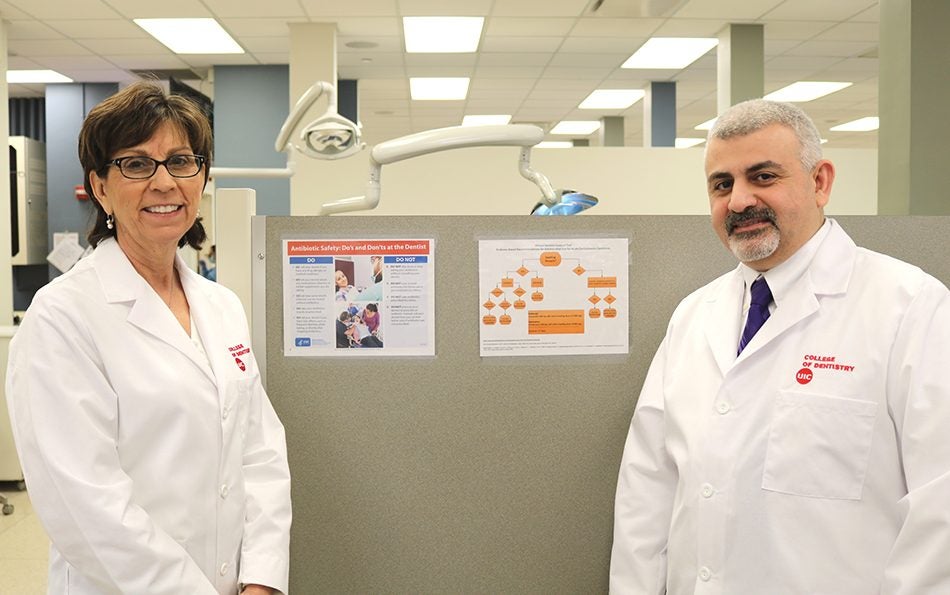Collaborative Program Results in Fewer Antibiotic Prescriptions

Introduction
Collaboration between the College of Dentistry, College of Pharmacy, and the University of Illinois Hospital and Health Sciences System (UI Health) has resulted in a significant reduction in the amount of antibiotics prescribed at the College of Dentistry.
“There are a number of recent of studies showing that dentists may be contributing to the development of antibiotic resistance through empirical prescribing patterns of antibiotics for their patients,” explained Dr. Susan Rowan, executive associate dean and associate dean for clinical affairs. “Antibiotic resistance has become a very critical population health issue.”
Dr. Alan Gross, clinical assistant professor, pharmacy practice, and Dr. Katie Suda, associate professor, pharmacy systems outcomes and policy, College of Pharmacy, are experts in antibiotic usage, with Suda’s research focusing on prescribing practices of dentists.
Gross and Suda provided the College of Dentistry with guidelines and additional information from the federal Centers for Disease Control and Prevention about how to create antibiotic programs within ambulatory clinic settings. Rowan, and the College of Dentistry’s Dr. Danny Hanna, clinical associate professor, oral medicine and diagnostic sciences, devised a program for antibiotic stewardship and prescription reduction at the College of Dentistry.
Suda and Gross, and Dr. Susan C. Beasdale, medical director of infection and prevention and Control, UI Health, participated in the analysis of the outcomes and development of the article.
“We started a campaign within the College of Dentistry to promote evidenced-based care concerning antibiotics in order to raise awareness relative to potential resistance issues,” Rowan said, The campaign included information in her “Monday Minute” weekly email to College of Dentistry students, faculty, and staff, and other initiatives led by Hanna, with collaboration by UIC College of Dentistry faculty Dr. William Flick, clinical professor, oral and maxillofacial surgery, and Dr. James Bahcall, clinical associate professor, endodontics. This team devised and implemented a multimodal intervention that focused on antibiotic use for acute oral infections.
Antibiotic stewardship “was a hot topic anyway, and then the State of Illinois made a push not just for ambulatory outpatient centers to do antibiotics stewardship but dental clinics, too,” Hanna explained. “We put up patient-facing signage in urgent care operatories, where sometimes patients request antibiotics that are unnecessary, and in all the clinics we put up signage for the providers, to educate them to be more conservative in prescribing.”
The team also “developed an evidenced based clinical decision support tool to help providers decide when to prescribe, gave that information to all the urgent care faculty, and posted the tool in the urgent care operatories so that both the faculty and students were following the same guidelines,” he said.
“We showed a significant decrease in the amount of prescriptions after those interventions,” Hanna said.
The results of the team’s assessment showed that among providers, the antibiotic prescribing rate per urgent care visit decreased by 72.9 percent. Clinical providers also reported that they had become more conscious of appropriate prescribing since implementation of the educational guidelines.
“Our faculty and residents heard the message, took it under advisement, and we saw a significant reduction in the amount of prescribing,” Rowan said. “We are proud of that.”
The UIC College of Dentistry is “one of the first dental schools in the country that has initiated an antibiotic stewardship program,” Rowan added.
The team reported its results in February in the journal Open Forum Infectious Diseases, and plans to move forward with new initiatives.
“Our next antibiotic stewardship effort has to do with premedication prescribing for people with joint replacements,” Hanna explained. “It was fairly common in the past, but not now—few scenarios result in the need to prescribe for such patients. After that, we will review the guidelines in the College of Dentistry for prescribing antibiotics for people with heart issues. We believe we can reduce prescriptions there as well.”